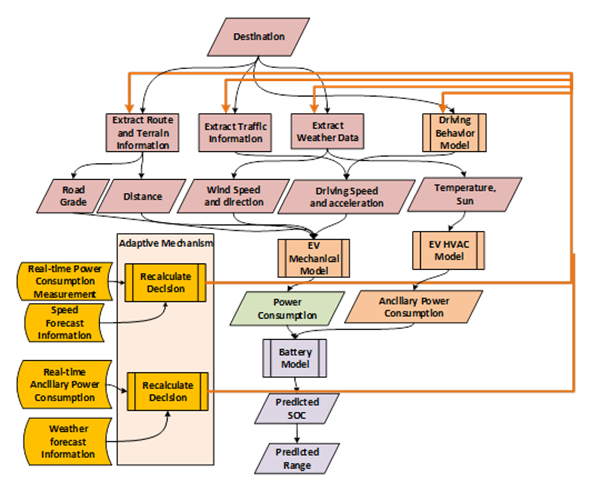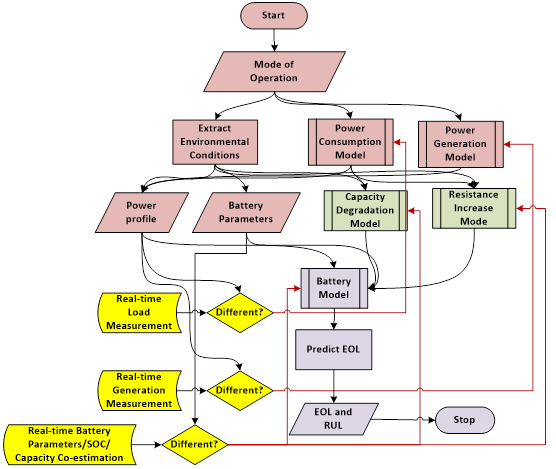
Big Data based Adaptive Range Estimation

The remaining driving range of an electric vehicle (EV) is a complex function of various types of data with different formats that need to be extracted and collected from different sources using big data analytics. In our previous project, we had designed a big data framework to extract, classify, and pre-analyze the data regarding the route, terrain, driving behavior, weather, etc. from different resources, and find the correlations between the data and range estimation.
In this project, we Incorporate and analyze the ancillary power consumed mainly by the heating, ventilating, and air conditioner (HVAC) system in calculating the driving range of the vehicle using big data analysis techniques. Moreover, the current version of the algorithm estimates the range based on certain assumptions about the driving conditions of each trip such as weather, driving behavior, road condition, etc. However, the driving conditions are subject to change due to unpredicted events along the trip (such as accidents, sudden climate changes, etc.) which can make the predicted range inaccurate. Therefore, we design an adaptive structure to update the predicted power consumption using weather forecast and traffic report information in real-time, to compensate for the changes in environmental and driving conditions.
Sponsor:
Prototyping a Smart Battery Gauge Technology for Stationary Energy Storage of Renewable Energy Resources
This project focuses on translating a novel Smart Battery Gauge technology to fill the increasing need for accurate battery state of charge (SOC) and remaining useful life (RUL) estimations for stationary energy storage of renewable energy. As compared to the existing battery monitoring methods, the reliably accurate estimation date generated by this technology will provide systems management and operations with the advantages of improved energy storage system efficiency, reliability, cost-effectiveness, longer lifespan, and reduced capital and operation/maintenance costs. In order to determine the technical feasibility and functional requirements of applying this technology in the stationary energy storage market and provide a commercially valuable solution, this project will result in a software prototype of the Smart Battery Gauge technology to demonstrate its real-time adaptive battery SOC and RUL estimations with market-leading accuracy and reliability, and its flexible customization for multiple different battery chemistries.
The objectives of this project are to:
1) Extract the relevant data and models that are needed for RUL estimation,
2) Design the adaptive predictive battery RUL estimation algorithm that can adjust battery parameters with real-time measurement feedback, and
3) Implement and demonstrate the Smart Battery Gauge technology prototype in software and benchmark its performance with existing approaches.

Cooperative Distributed Home Energy Management Systems

The goal of this project is to develop a cooperative distributed Home Energy Management System (HEMS) for 1) a single house, and 2) aggregated houses. In this cooperative distributed HEMS, energy sources and loads can coordinate and cooperate with each other to maximize the user comfort, meet the power constraints (e.g., avoid over-loading), optimize the power flows, decrease the system cost and the electricity bill in a single house and among aggregated houses. It also includes smart battery charging/discharging strategies to optimize the integration of the energy storage system. The project consists of design, development and demonstration phases.
Navid Rahbari Asr’s work on CoDES featured in Technician
Ph.D. candidate Navid Rahbari Asr’s work on Cooperative Distributed Energy Scheduling (CoDES) featured on TECHNICIAN, the official student newspaper of NC State University. Read the full story here: Researchers zap away control center


